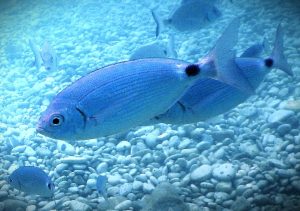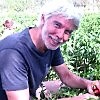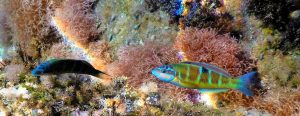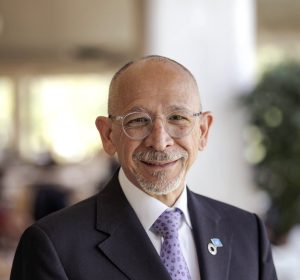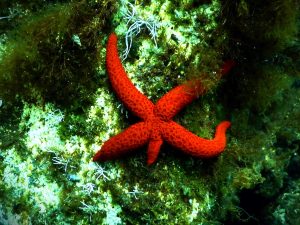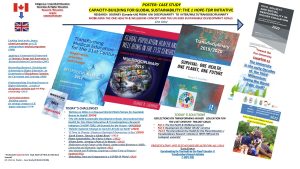IN A NUTSHELL
Editor's note 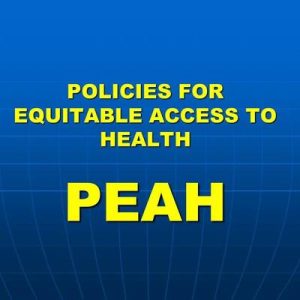 Menstruation matters in resource-limited countries where poverty substantially impacts menstruation health management. In this connection, PEAH had the pleasure to arrange a new interview to Ugandan stakeholder Ms. Gloria Nirere currently involved as Facilitator/Training lead, Research and Customer Service professional at AfriPads manufacturer (Kampala, Uganda).
First interview was made four years ago when she was serving as menstrual health management trainer at Kampala based WoMena NGO (find HERE).
Previously, Ms. Nirere long served in poorly equipped Ugandan contexts where she performed tasks concerning clinical research, community health, humanitarian assistance, and project management at local and national level
Menstruation matters in resource-limited countries where poverty substantially impacts menstruation health management. In this connection, PEAH had the pleasure to arrange a new interview to Ugandan stakeholder Ms. Gloria Nirere currently involved as Facilitator/Training lead, Research and Customer Service professional at AfriPads manufacturer (Kampala, Uganda).
First interview was made four years ago when she was serving as menstrual health management trainer at Kampala based WoMena NGO (find HERE).
Previously, Ms. Nirere long served in poorly equipped Ugandan contexts where she performed tasks concerning clinical research, community health, humanitarian assistance, and project management at local and national level
By Daniele Dionisio
PEAH – Policies for Equitable Access to Health
INTERVIEW

Gloria Nirere, MBA, BDS
Facilitator/ Training lead, Research and Customer Service professional
AfriPads, Kampala, Uganda
Menstruation is one of the most common and uniquely female experiences. The average woman will have 400 periods in her lifetime. That means she will spend over 3,500 days of her life menstruating. Yet for millions, the monthly cost of single-use menstrual products is simply unaffordable.
Millions of girls and women rely on unhygienic materials to absorb their monthly menstrual flow. These include old cloth, pieces of mattress and even reusing a disposable pad. In addition to these make-shift materials having a harmful impact on an individual’s health, they are undignified, uncomfortable and can make completing simple daily tasks a challenge.
Source: AFRIpads
–PEAH: Ms. Nirere, let’s begin with few remarks on menstruation challenges in Uganda and to what extent does poverty locally impact menstruation safe management.
–Nirere: It is to a large extent that poverty enhances menstrual challenges. For example, if people are poor, they will not afford to take their children to school. We have the Universal Primary and Secondary Education which is free of charge but again, most families cannot afford to buy scholastic materials, pay fees for lunch and breakfast which are the basic necessities in school. Now when it comes to provision of menstrual products, it is a by the way that’s why most parents have no separate budget for menstrual products and materials such as pads, underwear, school bag and soap for their daughters.
Poverty has also greatly contributed to Gender Based Violence. For example, some women have reported being beaten when they ask for financial support to buy menstrual products while others report that their husbands marry many women because they say that women are unclean while on their periods. Also, most girls opt for menstrual support from older men who in turn exchange it for sex leading to early marriages and unplanned pregnancies. It would take me a full day talking about Poverty, but be rest assured that its contribution greatly influences menstrual decisions and choices across the globe.
–PEAH: Ms. Nirere, AFRIpads was established in Sub Saharan Africa in 2010 with the goal of overcoming key challenges that women and girls face whilst on their period in relation to access, affordability and sustainability of menstrual products. Since then, AFRIpads has grown from a 3-person start-up to an award winning social enterprise that remains committed to improving menstrual health for millions across Africa and beyond. Under this perspective, AFRIpads aims to ensure that women and girls, who receive an AFRIpads Menstrual Kit, are also equipped with the knowledge and skills for maintaining a happy and healthy menstrual cycle. In a nutshell, EDUCATION IS KEY. In this regard, please focus all-round on your professional engagement and methods.
–Nirere: For more than 5 years working in this field as an educator, I have found that we have a lot of misconceptions hoovering in many communities. Starting at household level, most parents think that providing menstrual products is the main solver. We need to understand that educating communities about how and why menstruation occurs will make them aware that this is a natural and normal occurrence that requires total emotional, physical and social support. For example, in my trainings I often ask partner organisations to start by holding stakeholder meetings to involve parents, local leaders and government about the scope of MHH (Menstrual Health and Hygiene). We ask questions about latrine/toilet facilities, soap and underwear provision, ease of carrying out menstrual discussions, cultural restrictions etc. A full detailed menstrual training is executed so that by the time this girl is trained, the parents are willing and ready to provide the necessary support. I HUMBLY SUGGEST! All families should look at menstrual needs at household expenses and they should have a separated budget.
I have also discovered that TRUST is a key component for successful menstrual education. Menstrual discussions have been and are still private talks between mother- daughter or any other female relative/peers. Normalizing menstruation starts with trust. Is the person providing education building trust? Are participants willing to share their experience? Do the trainers pay attention to body language? What language is the trainer using? (This can either ehnance myths or appear offensive if less attention is payed), Has the trainer carried out background research on participants? And many more. All these allow participants to feel comfortable around the trainer and positively improve post menstrual experiences.
–PEAH: What do you think about the importance of male involvement in menstruation education initiatives in Uganda?
–Nirere: Check out my blog post on male engagement HERE. You will discover how much you did not know about why males should fully engage in menstrual interventions. In short I would say, our communities even the modern ones have not digested or welcomed menstrual discussions and I think that’s why we are still finding it hard to have all menstrual products tax exempted in many nations and better menstrual services. Also, the power in political, social and cultural spheres are dominated by males making it difficult carry out healthy menstrual discussions and decisions.
–PEAH: Coherently with belief that menstrual health goes beyond menstrual products, AFRIpads provides partners, alongside reusable menstrual kits, with a range of resources including a MHH (Menstrual Health and Hygiene) Education Toolkit and a Monitoring and Evaluation framework, encompassing instruments like TRAINING OF TRAINERS HANDBOOK, E-LEARNING TRAINING OF TRAINERS, FLIP CHART PACKAGE, PARTICIPANT BOOKLET, INFORMATION POSTER, and EVALUATION TOOLS. Can you kindly enter into the merits of each?
–Nirere: Upon purchase of AFRIpads products, partner organisations are given free online education and access to the training materials. The training is delivered in a Train the Trainer format after which partner staff can sustainably contact menstrual health trainings. They are given certificates as competent MHH trainers and these are awarded after passing evaluation tests administered during the training.
Trainers are given the GirlTalk Handbook which is a trainers manual, they are required to read and understand the session. I keep following up on progress and answer questions.
FLIP CHART PACKAGE: these are charts hanged on the walls as the trainer is providing the education. We know that some participants easily relate to visuals rather than listening all the time, this tool makes trainings memorable as participants can relate to the information given with the displayed visuals.
PARTICIPANT BOOKLET: these are take home booklets given to participants so that they can keep refering to in case they need to remember. It contains practice questions and leads to communal knowledge sharing.
INFORMATION POSTER: this is displayed in strategic locations where anyone around can look at, interprete and learn from it. It also promotes menstrual knowledge in communities around.
EVALUATION TOOLS: participant knowledge is evaluated before and after the training. This is a key component for all trainers to get certificates. We want to have competent trainers who can deliver MHH trainings on behalf of their organisation.
DATA COLLECTION TOOLKIT: this booklet contains a 10 step guide on how to successfully collect MHH data. Data collection training is provided following this guide and this leads to making informed decisions before and after carrying out menstrual interventions.
–PEAH: On this wavelength, something more about instruments like the Girl Talk Booklet and the Data Collection Toolkit?
–Nirere: The Girl Talk Booklet consists of Flipchart package, posters, Girl Talk handbook, participant booklet and Training evaluation while the Data collection Toolkit consists of Visual Aids, Surveys, Consent forms and Focus Group Discussing (FGD) Guides.
–PEAH: AFRIpads believes that pairing reusable menstrual kits with an education curriculum is essential for breaking menstrual barriers, addressing taboos and improving menstrual health and hygiene worldwide. As such, what about the global benefits of AFRIpads reusable menstrual kits?
–Nirere: By pairing AFRIpads reusable pads with education and Data collection ensures it is an all round sustainable solver for menstrual barriers. The contribution of AFRIpads reusable pads globally has quite overwhelming positive results because now we have seen over 5 Africa based reusable pad manufacturers that have picked an inspiration from AFRIpads story, the product is more sustainable, cost effective and environmentally friendly, it is culturally acceptable and appropriate, it has no gells or scents added and it has quality certified.
–PEAH: This matches with the scope and aims of the AFRIpads Foundation, established in July 2010, to raise funds and distribute reusable sanitary pads for vulnerable, disadvantaged girls, who lack the means to buy an AFRIpads Menstrual Kit themselves. For instance, girls living in refugee camps, who may not have the means to purchase their own pads. For only 7,50 euro one girl can be provided with an AFRIpads Menstrual Kit, which can support her to manage her period for an entire year. Please, add information about.
–Nirere: AFRIpads company is a social profit making enterprise which uses its profits to sustain the comptent staff in the factory and in various offices within and outside Uganda. Thanks to the AFRIpads Foundation working tirelessly to pull funds to support many underprivileged communities and uplift the beautiful work of small NGO’s not only in Africa but across the globe.
–PEAH: In this connection, kindly tells us about The Use and Care sheet (available in English, Swahili, French, Portuguese, Kinyarwanda, Arabic and more languages upon request) as an hard laminated, waterproof guide to ensure users are informed on how to use AFRIpads reusable pads safely and effectively.
–Nirere: The use and care instruction guide has steps to follow for proper use and care of the product. Once an organisation buys our products or gets a donation from AFRIpads Foundation, they receive the use and care laminated instruction sheet, the same sheet is designed as a leaflet inserted in all packaged AFRIpads packets (School girl kit, Standard 4 pack, Standard 6 pack and Custom Kit). Depending on the location of targeted users, the leaflet can be translated in the language that speaks well to them.
–PEAH: Your duties imply training of trainers: let us know more as for your approach and tools.
–Nirere: As the train lead at AFRIpads, Training of trainers involves an approach of providing information on how to successfully execute effective MHH trainings. I make background checks about the organisation and participants requesting for the training, schedule in person and online meetings to identify and assess needs, organize tailored training materials, share tips of MHH trainings and make follow up to check successful execution of trainings provided by trainees.
The training has a lot of online and in person activities like group discussions, individual tasks, role plays, brainstorming and many more.
A 3 hour training is executed using the AFRIpads Girl Talk handbook which has 3 sessions. Participants get engaged and learn how to introduce the session, dos and don’ts. Their MHH knowledge is evaluated before and after the training.
–PEAH: Once again, thank you Ms. Nirere for your exhaustive answers and very deserving commitment
Millions of women and girls worldwide still cannot afford menstrual products or access water and sanitation facilities to manage their menstrual health and hygiene. Periods make them miss school, work, and negatively impact their health, but it does not have to be that way.
Source: UN Women Africa
